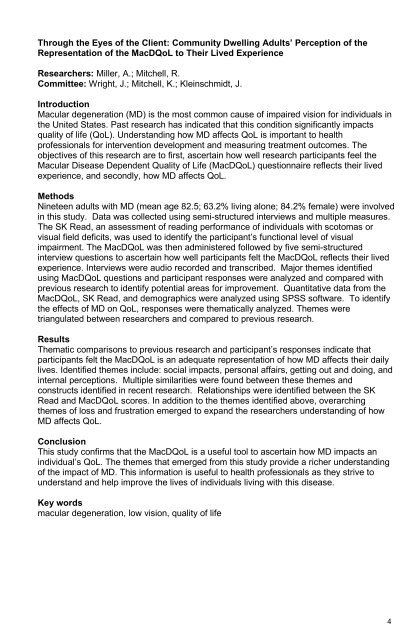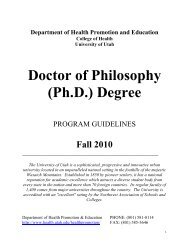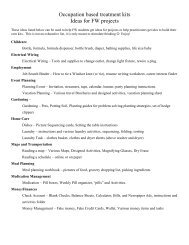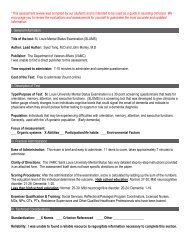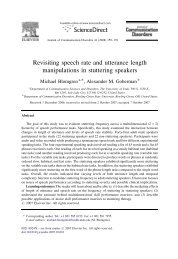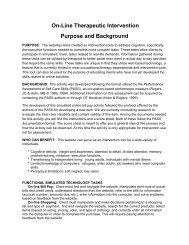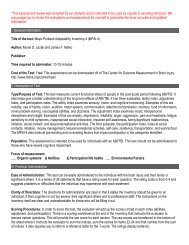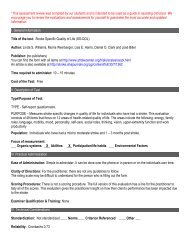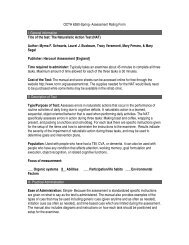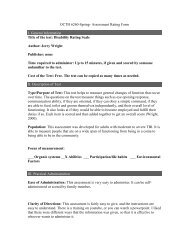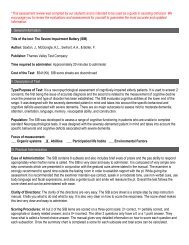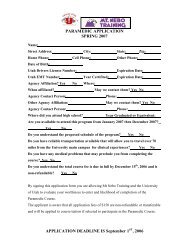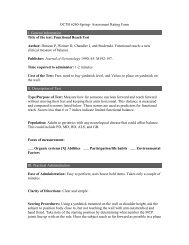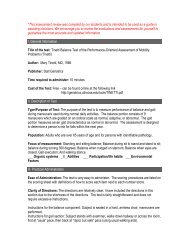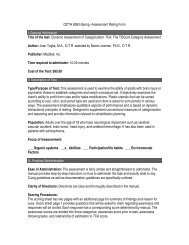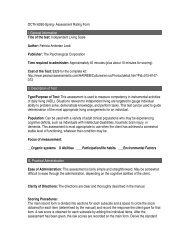2011 Symposium Program - College of Health - University of Utah
2011 Symposium Program - College of Health - University of Utah
2011 Symposium Program - College of Health - University of Utah
Create successful ePaper yourself
Turn your PDF publications into a flip-book with our unique Google optimized e-Paper software.
Through the Eyes <strong>of</strong> the Client: Community Dwelling Adults’ Perception <strong>of</strong> the<br />
Representation <strong>of</strong> the MacDQoL to Their Lived Experience<br />
Researchers: Miller, A.; Mitchell, R.<br />
Committee: Wright, J.; Mitchell, K.; Kleinschmidt, J.<br />
Introduction<br />
Macular degeneration (MD) is the most common cause <strong>of</strong> impaired vision for individuals in<br />
the United States. Past research has indicated that this condition significantly impacts<br />
quality <strong>of</strong> life (QoL). Understanding how MD affects QoL is important to health<br />
pr<strong>of</strong>essionals for intervention development and measuring treatment outcomes. The<br />
objectives <strong>of</strong> this research are to first, ascertain how well research participants feel the<br />
Macular Disease Dependent Quality <strong>of</strong> Life (MacDQoL) questionnaire reflects their lived<br />
experience, and secondly, how MD affects QoL.<br />
Methods<br />
Nineteen adults with MD (mean age 82.5; 63.2% living alone; 84.2% female) were involved<br />
in this study. Data was collected using semi-structured interviews and multiple measures.<br />
The SK Read, an assessment <strong>of</strong> reading performance <strong>of</strong> individuals with scotomas or<br />
visual field deficits, was used to identify the participant’s functional level <strong>of</strong> visual<br />
impairment. The MacDQoL was then administered followed by five semi-structured<br />
interview questions to ascertain how well participants felt the MacDQoL reflects their lived<br />
experience. Interviews were audio recorded and transcribed. Major themes identified<br />
using MacDQoL questions and participant responses were analyzed and compared with<br />
previous research to identify potential areas for improvement. Quantitative data from the<br />
MacDQoL, SK Read, and demographics were analyzed using SPSS s<strong>of</strong>tware. To identify<br />
the effects <strong>of</strong> MD on QoL, responses were thematically analyzed. Themes were<br />
triangulated between researchers and compared to previous research.<br />
Results<br />
Thematic comparisons to previous research and participant’s responses indicate that<br />
participants felt the MacDQoL is an adequate representation <strong>of</strong> how MD affects their daily<br />
lives. Identified themes include: social impacts, personal affairs, getting out and doing, and<br />
internal perceptions. Multiple similarities were found between these themes and<br />
constructs identified in recent research. Relationships were identified between the SK<br />
Read and MacDQoL scores. In addition to the themes identified above, overarching<br />
themes <strong>of</strong> loss and frustration emerged to expand the researchers understanding <strong>of</strong> how<br />
MD affects QoL.<br />
Conclusion<br />
This study confirms that the MacDQoL is a useful tool to ascertain how MD impacts an<br />
individual’s QoL. The themes that emerged from this study provide a richer understanding<br />
<strong>of</strong> the impact <strong>of</strong> MD. This information is useful to health pr<strong>of</strong>essionals as they strive to<br />
understand and help improve the lives <strong>of</strong> individuals living with this disease.<br />
Key words<br />
macular degeneration, low vision, quality <strong>of</strong> life<br />
4


